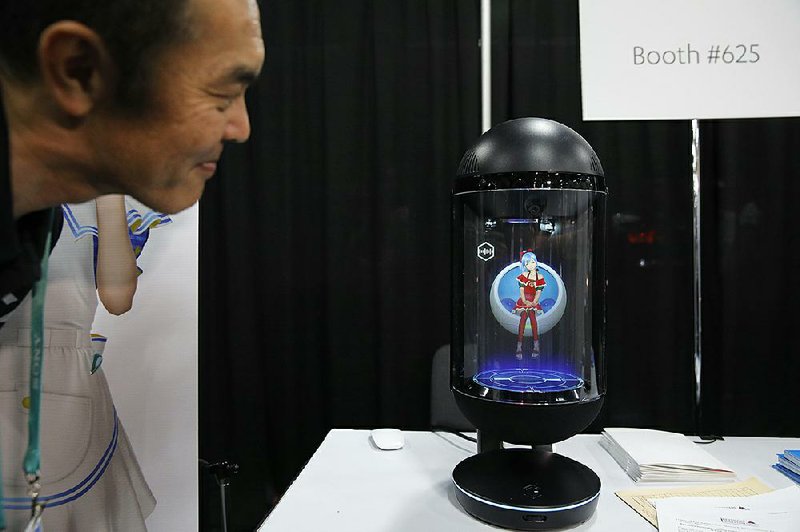From the face scanner that will check in some attendees to the cameras-everywhere array of digital products, the Consumer Electronics Show gadget showcase is all-in on surveillance technology -- whether it calls it that or not.
Nestled in the "smart home" and "smart city" showrooms at the sprawling Las Vegas consumer tech conference are devices that see, hear and track the people they encounter. Some of them also analyze their looks and behavior. The technology on display includes eyelid-tracking car dashboard cameras to detect distracted driving and "rapid DNA" kits for identifying a person from a cheek swab sample.
All these talking speakers, doorbell cameras and fitness trackers come with the promise of making life easier or more fun, but they're also potentially powerful spying tools. And the skeptics who raise privacy and security concerns can be easily drowned out in the flashy spectacle of gee-whiz technology.
"Many, many horrible stories have come out of consumer electronics," said Cindy Cohn, executive director of the Electronic Frontier Foundation, who is speaking on a conference panel about the future of internet-connected devices. "It's often about hyping the next thing you can buy and not considering the trade-offs."
The conference runs today through Friday after two days of media previews. The annual showcase is where big companies and startups unveil and promote their latest gadgets, many of them infused with microphones, cameras and artificial intelligence. Though weighted toward the consumer market, much of what's on display may also be useful to law enforcement, not to mention prying employers or heavy-handed governments.
[Video not showing up above? Click here to watch » https://www.youtube.com/watch?v=yX_NRRDxdf4]
Marcus Yang, chief executive officer of the camera startup Amaryllo, said he's had a difficult time persuading customers to pay more for safeguards such as faster processors to enable end-to-end encryption, when an array of cheaper, but less secure options are available.
Conference attendees "want to see technology and something fresh," Yang said. "They're only interested in looking at your cameras and what kind of features they have."
Yang said he's hopeful that "something is changing this year" after a series of privacy scandals and security breaches has brought attention to the dangers of unfettered surveillance technology. And eventually, he said, regulators are likely to step in with security requirements.
Amazon's security camera division Ring, which has set up a "Ring House" at the conference to show off its home devices, recently had to defend its safety practices following reports of hackers breaking into Ring camera systems and harassing children. It's also faced criticism from privacy advocates and U.S. lawmakers over its growing partnerships with police. At the conference on Monday, the company announced a new "control center" for camera owners to adjust their privacy settings and opt out of police requests for footage.
Ring competitor Wyze Labs, an honoree in the CES 2020 innovation awards, announced a data breach just after Christmas affecting 2.4 million customers. And widely used voice assistants made by Google, Amazon and Apple all came under scrutiny in 2019 for data retention practices that allowed employees and contractors to listen to users' audio recordings.
There's been some pushback, at least on facial recognition and other surveillance technology from China. Hikvision and iFlytek, two Chinese tech companies that showed off their artificial intelligence at the 2019 conference, now face U.S. export restrictions because the President Donald Trump administration says the technology has been used in the repression of China's Muslims.
But China isn't the only place where the lines have blurred between consumer technology and government surveillance operations. Watchful residents of American neighborhoods are increasingly encouraged by Ring to share their doorbell video footage with police detectives. And device-makers are counting on consumers buying into ever-more elaborate forms of computer vision and other artificial intelligence technology to give them peace of mind.
Home security camera maker Arlo this week launched its first wireless floodlight camera, with night vision, a siren, two-way audio to converse with intruders and an ambient light sensor to automatically adjust its brightness. Another company, Sunflower Labs, is using the conference to show off its "home drone security" system. A trespasser stepping on to someone's lawn triggers a camera-equipped drone that flies out from its resting place to take a look at them and stream the live video to the homeowner's phone.
Serious talk about privacy protections and regulations isn't completely absent at the conference. The schedule includes panel talks connecting policymakers with privacy executives from companies like Apple and Facebook.
Venture capitalist Rajeev Chand, who is moderating one of those panels, said tech companies are getting better at seeing themselves as custodians, not the owners, of user data, but much more needs to be done.
[Gallery not loading above? Click here for more photos » arkansasonline.com/17show/]
"We are probably at the first or second inning for how privacy reshapes the consumer tech industry," said Chand, a partner and head of research at Wing Venture Capital.
Gary Shapiro, CEO of the Consumer Technology Association, which organizes the conference, dismissed privacy concerns, saying that attendees have a choice.
"You're opting in," he said. "If you want to do it, you'll have an opportunity to do it."
Cohn, of the Electronic Frontier Foundation, said she plans to skip the face scanners because she doesn't know who has control over the images they collect. She said there's only so much that consumers can do to guard against misuse.
"There is a risk treating this as an individual decision," she said. "That's not really fair or right to do to people. We need to fix the policies."
Information for this article was contributed by Rachel Lerman and Joseph Pisani 0f The Associated Press.
Business on 01/07/2020
